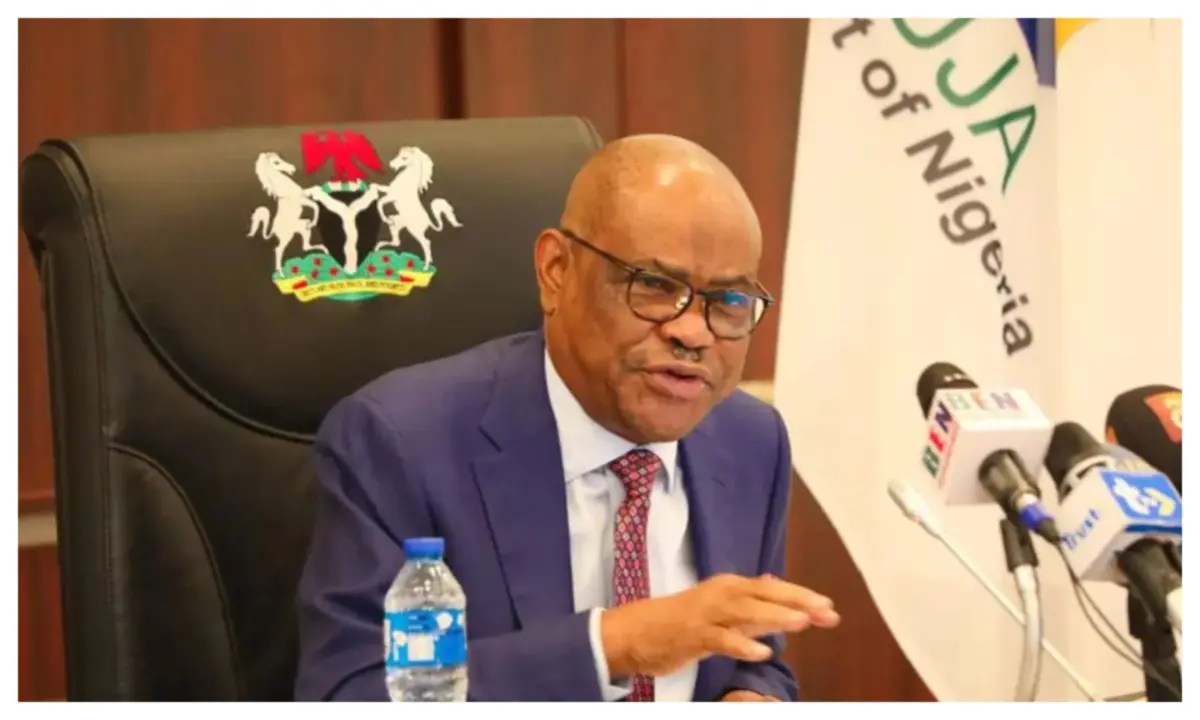At a recent monthly press briefing in Abuja, Nyesom Wike – the Minister of the Federal Capital Territory – spoke clearly about the state of the Peoples Democratic Party (PDP). If you have followed Nigerian politics at all, nothing he said is really surprising. Yet there was something about the way he put it: direct, almost resigned, as if he had been expecting it for a long time. He warned that if the party did not resolve its problems, it would continue to lose. This is the short version. The longer story is more complicated.
What Wike sees – and what he’s been saying for a while
Wike has been predicting trouble within the PDP for some time. He told reporters he saw the crisis coming long before most people. Listening to him, it feels like he’s observing the slow construction: small fractures here, rash decisions there, and people playing games as the foundations weaken. He says everything he warned about happened. Whether you agree with his point of view or not, the narrative follows a familiar pattern: warnings are ignored, consequences come, accusations are then pointed out.
Also Read: When Noise Meets Silence: Why Lagos APC Says ADC No Longer Matters
He pointed to the wave of defections as a clear sign of a party in trouble. For him, these departures are not just political maneuvers: they are embarrassing. Not in a fleeting way, but in a way that damages the reputation and morale of the party. People leave; it happens. But when departures become a habit and are accompanied by visible internal confusion, it signals a deeper rot. Wike’s use of the word “embarrassing” conveys a mixture of frustration and a kind of brutal pride: he says, I told you this would happen.
The convention episode – a revealing example
One specific example he cited concerns conduct at a party convention. Wike mentioned a governor who chaired the convention committee and implied that things had been mishandled – or at least, not seriously. This is not a small detail. Conventions are meant to project unity and competence. When these events are tainted by poor planning or, worse, manipulation, they not only disappoint party members; they give ammunition to opponents. Wike’s point was blunt: those who should be protecting the integrity of the party instead allowed games to take place. This, he said, partly explains why the PDP continues to lose ground.
He seems to be saying, in other words: this is not a coincidence. It’s not just bad luck. It is the predictable result of weak processes, poor decisions, and leaders who are not fully committed to stability or fairness. This is a harsh judgment and, naturally, some will object to it. But Wike’s confidence that his warnings will come true suggests he wants the party to take his criticism seriously – perhaps even act on it.
Tone and posture: anger, regret and a hint of justification
There is an emotional texture to Wike’s remarks that is worth noting. He looks angry at what’s happening, and almost regretful, like someone who tried to steer a course but was ignored. At the same time, one can detect a hint of justification: “I said it all along,” he repeats – not just to boast, but to emphasize that his diagnosis was correct. It’s a combination human enough to be believable: a leader angered by incompetence, disappointed by results, but strangely satisfied that his foresight is now apparent.
Also read; We’re not done yet — Enugu PDP says it will rebuild and win
This mix of feelings also makes his criticism harder to dismiss out of hand. People who care about the PDP – members, supporters and even casual observers – may not like the tone, but they will likely agree that the issues it raises deserve attention. If you’re at the party, Wike’s words are a wake-up call; if you’re out there, they confirm what you suspected. Either way, it will increase pressure on party leaders to show that they can manage their affairs better.
What needs to change – and why it’s not easy
Wike says things are not being done properly. Fair enough. But why is this difficult to solve? Political parties are complex networks of ambition, loyalty, regional interests and personal relationships. Addressing this requires not only policy changes, but also behavioral and cultural changes. We cannot simply decree better skills. People need to buy in. And when people are already leaving – when defections make headlines – convincing others to stay or return is a daunting task.
He essentially challenges the PDP to get serious: clean up the way decisions are made, restore trust and stop tolerating the kind of “games” he described. But the real test is not just rhetoric. It’s a question of whether the party can implement reforms that actually stick. This means transparent processes, credible leadership and a willingness to discipline actors who undermine the party. Easier said than done.
Also read: Twenty days of education: Wike’s plan to put schools in the spotlight
One final thought – complicated, but important
Wike’s message is clear and unvarnished: continue as you are and you will continue to lose. There’s a certain brutal logic to this, although one might question his motivations or his timing. Politics rarely offers clear solutions. His warning nevertheless constitutes a useful nudge. If the PDP is to change course, it will need more than campaign slogans and public defenses. This will require some real self-examination and, yes, a little humility. Maybe they’ll get there. Maybe they won’t. Either way, Wike thinks the pattern is obvious – and he’s not shy about saying it.
